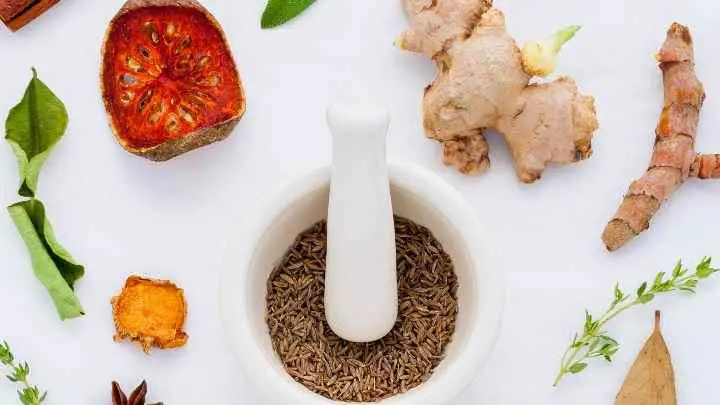Ginger is an aromatic, fragrant plant that adds flavor and zip to many dishes. It’s also used as a natural remedy for everything from an upset stomach to arthritis pain.
In many culinary recipes, it’s often referred to as a herb, while some others call it a spice. So, what is the truth about ginger, and is it spicy or not? Yes, ginger is spicy, and you’ll see reasons why as you read on.
History of ginger
Ginger (Zingiber officinale) is a popular spice with a long history of use in culinary and medicinal applications. The plant is native to China and India and has been used for centuries in traditional Chinese and Ayurvedic medicine.
Ginger has a wide range of potential health benefits, including relief from nausea, pain, and inflammation. It may also help boost immunity and improve digestion.
Ginger is a member of the Zingiberaceae family, which also includes turmeric, cardamom, and galangal. The plant grows to a height of about 1 meter (3 feet) and has narrow, lance-shaped leaves.
The underground stem, or rhizome, is the part of the plant used for both culinary and medicinal purposes.
The appearance of ginger
Ginger most often comes in the form of a root, which is fibrous and gnarled. The skin of the ginger root can be light brown, tan, or even off-white.
The flesh of the ginger root is also usually light brown or tan, although it can be white in some cases.
When cut open, ginger root is filled with small, thin tubes that contain the plant’s juice. This juice is responsible for both the root’s characteristic aroma and its fiery flavor.
SEE: Ginger vs Ginger Root
Why is ginger so spicy?
Spicy foods are those that contain high levels of chili peppers, and yes, ginger, or other spices. One reason ginger is so spicy is that it contains a substance called gingerol. Gingerol is what gives ginger its characteristic pungent flavor.
When gingerol is exposed to air or undergoes thermal degradation, it turns into zingerone, which is also responsible for the sharpness of the spice.
These compounds interact with the human body to create a sensation of heat. Ginger also contains other volatile oils that can add to its spiciness.
Why does ginger have compounds that make it so spicy?
It is thought that they may help the plant defend itself against predators and pests. The strong flavor of the spice may deter animals from eating the plant, or it could even repel insects. These compounds may also help the plant to ward off fungal infections.
While the exact reason why ginger is so spicy is not fully understood, there is no doubt that this root has a long history of being used as a spice. In addition to its flavor, ginger is also prized for its medicinal properties.
Is pickled ginger spicy?
Yes, it is spicy. The heat comes from the ginger root itself, which is a very strong spice. When this root is pickled in vinegar and then eaten, it can provide a strong, sharp flavor that can be quite overwhelming for some people.
If you are not used to eating spicy foods, you may want to start with a small amount of pickled ginger to see how your taste buds react.
Is ground ginger spicy?
Yes, ground ginger can be spicy. Again, if you are not used to eating spicy foods, you may want to start with a smaller amount and gradually increase it to find the level of spiciness that you prefer.
Some people find that they enjoy the flavor of ginger more than the spice, so it is ultimately up to your personal preference.
Is raw ginger spicy?
Yes, it is spicy. It has a sharp, peppery flavor that can add a kick to dishes. Some people find that they can handle more spice as their bodies adjust, while others may never be able to eat raw ginger without feeling any discomfort.
Does fresh ginger make food spicy?
Yes, fresh ginger can make food spicy. When used in cooking, ginger gives dishes a unique flavor and can add a bit of heat. When used fresh, ginger is incredibly potent.
If you want to add some spice to your meal without making it too hot, start with a small amount of fresh ginger and add more to the taste. You can also use ground ginger or dried ginger, which will be less spicy than fresh ginger.
Experiment with different types of ginger to find the flavor and level of spiciness you prefer.
SEE: Find Out if Ginger Beer Is the Best Option for a Gluten-Free Diet
Is red ginger spicier than dried ginger?
Yes, it is. The level of spiciness can vary greatly from one ginger root to another. However, red ginger is typically considered to be spicier than dried ginger.
Additionally, how the ginger is prepared can also affect its level of spiciness. For example, if the ginger is finely grated or minced, it will be spicier than if it is simply chopped.
Overall, red ginger has a peppery, bitter, pungent, and stronger aroma than the common ginger you’ll find around.
How do you take the spice out of ginger?
One way to take the spice out of ginger is to blanch it. To do this, cut the ginger into thin slices and then place it in boiling water for a few minutes.
After a few minutes, remove the ginger from the boiling water, then place it in cold water. This will help to remove some of the ginger’s spiciness.
Another way to reduce the spiciness of ginger is to pickle it. To pickle ginger, slice it into thin pieces, then place it in a jar with vinegar and water. Let the ginger sit in the pickling solution for a few days before consuming it.
How do you make ginger tea less spicy?
There are a few ways to make ginger tea less spicy. One way is to add more water or milk to the tea. This will help to dilute the spiciness of the ginger.
Another way is to add sweeteners like honey or sugar to the tea. This can help to offset the spiciness of the ginger.
Finally, you can try using less ginger in the tea. This will make the tea less spicy overall. Experiment with these methods to find the one that works best for you.
Why do you feel hot after drinking ginger?
There are a few reasons why you may feel hot after drinking ginger. One reason is that ginger can increase blood circulation. This can cause your body to feel warmer as more blood flows through your vessels.
Additionally, ginger may also stimulate sweating, which can also make you feel hotter. Finally, the spiciness of ginger may also add to the sensation of heat.
However, these effects are generally short-lived and should dissipate soon after you finish drinking your ginger beverage.
SEE: Can You Freeze Ginger?
FAQs
Is turmeric spicier than ginger?
Yes, it is. Turmeric does have a slightly different taste than ginger, but they are both quite strong spices, so it can sometimes be hard to tell the difference. It tastes bitter and earthy and can be found in powder or fresh form.
When used fresh, it has a similar taste to ginger, and it is commonly used in Indian and Asian cuisine and gives curry its yellow color. Overall, turmeric is the most intense and bitter flavor.
Is ginger spicy or bitter?
It is both. Ginger is a root with a wide range of flavors, depending on how it is used. It can be spicy or bitter, depending on the dish.
When used in baking, it is often combined with other spices to create a more complex flavor, the same as when you use it in savory dishes. Finally, when you burn it, its flavor becomes bitter very easily.
What does ginger taste like?
Ginger has a spicy, woody taste that is both sharp and aromatic. It is often used to add flavor to food or to mask the taste of other ingredients. When used in large quantities, ginger can have a numbing effect on the tongue.
How can you tell if ginger is spicy?
By its smell. Ginger has a spicy smell that is hard to miss. It also has a firm feel, and when it gets soft, it just shows its time to discard it.
SEE: Is Ginger Beer the Best Option for a Gluten-Free Diet
Conclusion
Ginger is spicy. It has a pungent, earthy flavor that can be a little overwhelming for some people. However, when used in moderation, ginger can add a lot of flavor to dishes without making them too spicy.
If you’re looking for a little bit of heat, try adding a small amount of ground ginger to your recipe. You can always add more if you want it to be spicier.
Thank you for reading.
Did you enjoy reading? See other helpful guides here on Cheffist.







